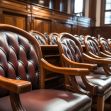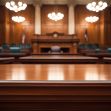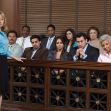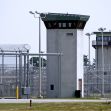In an attempt to prevent defense attorneys from scoping out information about prospective jurors on the Internet, one California court adopted the general procedure of withholding their names in felony cases. An appeals court ruled that such a general practice could violate a defendant’s constitutional rights and should only be used if the particular circumstances of an individual case warranted it.
Defendant Joe Lopez asserted that the nondisclosure practice that required jurors to be identified only by their badge numbers violated his constitutional rights. Lopez was ultimately convicted of murder and gross vehicular manslaughter while intoxicated. He was sentenced to 15 years to life for the murder and six additional years for the vehicular manslaughter, the latter of which was stayed.
Judge Gail Ruderman Feuer of the Court of Appeal for California’s District Seven explained that although the use of badge numbers rather than names does protect jurors’ privacy, the trial court’s general practice of withholding names was unacceptable and is only to be used in specific circumstances where the case meets certain criteria, including “extensive publicity” as set forth in federal cases she later cites.
She said, “In the absence of a compelling need specific to the case to conceal names…this was an abuse of discretion.” She also said the court erred when the judge told the prospective jurors that they would be referred to solely by their badge numbers for “security reasons.” She said jurors might “speculate” that the defendant posed a security risk. However, she concluded, the practice of withholding names was harmless error, and therefore reversal of the conviction was not required.
Lopez also claimed that the court also abused its discretion when it denied his request to have his admission of “killing someone” excluded because it occurred during a phone call to his sister. The call was taped and played for the jury. Denial of this motion was affirmed.
During the trial, witnesses described how Lopez crashed into a car that was parked on the side of the road on a highway near Palmdale. The driver had pulled over to take a nap. One witness saw Lopez’s car speeding and another said it parked near the site of the accident. Both called 911. When police and fire trucks arrived, they found Lopez who “smelled of alcohol” and had “red and watery eyes.” A medical test showed Lopez has a blood alcohol concentration of 15%, double the legal limit. He admitted that he was the driver that hit the car that was now on fire. Sam Edinburgh was trapped inside and died as a result of the collision.
When the trial began, 63 potential jurors were brought to the courtroom. The attorneys were not given their names, and when the defense attorney requested them because he wanted to “have an idea of the ethnicity of the jurors, have an idea where they come from,” presiding Judge Cynthia L. Ulfig said, “You are not going to get the names ...You just get [a] random list without names.” She went on to explain the reason for this denial. “I don’t give out names because I have had attorneys googling, making improper contact with jurors… (Most of) of my colleagues in the building do not give out the names.” She told the court that the practice of concealing the names of potential jurors in murder and other felony cases began in “2008 or 2009 when defense counsel in a case was sitting at counsel table researching jurors on the Internet.” She also said that jurors’ names and other sensitive information about defendants and members of their families were posted on social media. She noted that a journalist had also been present in court. Ulfig, the trial judge, recounted the other ample forms of information that were available to attorneys through an extensive questionnaire and voir dire.
Judge Feuer’s opinion recounted the governing law about revealing jurors’ names during and after a trial. She noted that post-trial records should not be sealed unless there is “a compelling interest against disclosure. A compelling interest includes, but is not limited to, protecting jurors from threats or danger of physical harm,” according to the California Code of Civil Procedure section 237. The rule during a trial is different, she said, while referencing the law governing the disclosure of names in federal court.
“The empanelment of an anonymous jury” is allowed only when necessary to facilitate jury factfinding, to ensure juror protection or to “minimize any risk of infringement upon the fundamental rights of the accused,” Feuer wrote. She cited several cases that explain that withholding names “implicates a defendant’s constitutional rights.” She therefore was reviewing the “erroneous use of an anonymous jury under the standard of…whether the error was harmless beyond a reasonable doubt.”
When Judge Feuer applied this standard of review to the facts in the Lopez case, she concluded that “there was no evidence of any danger of physical harm or likely interference with the prospective jurors if their names were disclosed.” The defendant did not meet the criteria for withholding even though, if convicted, he would face a life sentence. Feuer wrote, “this factor alone does not show that Lopez posed a risk to jurors, especially given that his life sentence was based on this driving under the influence, not an act involving physical violence.” He was neither involved in organized crime, gang activity, or any criminal enterprise. He was employed and had no criminal record.
The judge also denied that the use of social media, as a general rule, justifies juror anonymity. “These concerns are not based on the actual risk to prospective jurors in a specific case,” as required under the law, she wrote. Similarly, “The presence of a lone reporter in the courtroom does not constitute the type of “extensive publicity” the federal courts have found supports juror anonymity,” she concluded.
Lopez failed to support his motion to have his conviction overturned. Feuer said, “The People have met their burden on this record to show that the trial court’s error in concealing the jurors’ names from the attorneys did not prejudice Lopez’s ability to obtain adequate information about the jurors necessary to conduct an effective voir dire.” In addition, the practice of withholding names was “harmless beyond a reasonable doubt, because so much information about the jurors was obtained through questionnaires and voir dire questioning.”
The call to his sister was also found to lack the grounds for an appeal because his admission of guilt to her was cumulative to other evidence.
Feuer affirmed the judgment of the trial court with two concurring justices. In doing so, she also made it clear that the San Fernando Valley Courthouse should not continue its practice of concealing the names of prospective jurors even though the Internet might disclose additional information about them.






